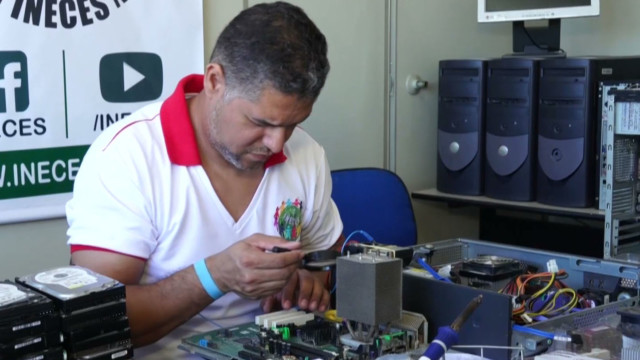Gambling is illegal in Brazil, but electronic bingo and slot machines are easy to come by in big cities.
“The police do weekly raids on gambling dens and overtime we seize these kinds of these electronic machines,” said Icaro Ruginksi, the chief of the costumes and entertainment division of Espirito Santo State Police in Brazil’s southeast.
The seized machines end up in police storage and normally would be destroyed. But after a partnership with the nonprofit organization Ineces, they are being refurbished by volunteers for low-income children and teenagers in Espirito Santo state.
CGTN’s Paulo Cabral reports.
“The machines come to us all disassembled. We look into all parts, and build new computers. Then we look for communities which do not have access to any technology and send the machines”, said Rafael Burani, the legal director of Ineces.
The machines are prepared by volunteers.“It’s really great to know that we can rework a machine that was being used for crime, to serve education purposes for people who really need it,” said volunteer computer technician, Marcos Schimidt.
Children then have the opportunity to work with refurbished computers built with parts from other desktops. Volunteers often need parts from two or even three different machines to assemble one usable computer. But it’s enough to make a big difference in the education of low-income students.
Catholic mission Arca da Aliança (Ark of the Covenant) is found in Cariacica in the greater Vitória area. It is one among the number of organizations that receive the computers. Children and teenagers from poor families can spend time in the institution when they are not at school.
“These machines are great for them to have first contact with the computers. It’s very helpful, and they’re very interested in them! They want to get on social networks and do their research and their homework on them,” said the project coordinator Claudia Oliveira.
The project works with 70 children and teenagers who would rarely have contact with computers otherwise.
“We didn’t have any computers here! Now we can use them to do our research. Much faster to do homework now”, said 13-year-old student, Lucas Magalhães.
“It’s great! We can check stuff in Google, research and complete our homework.” said 13-year-old student, Emily Ribeiro.
In the past, Brazil’s slot machines were used for crimes. Now, they’re helping kids create an honest future for themselves.
 CGTN America
CGTN America
